Solar farms in 3 states cited for environmental violations

Four companies that developed solar energy facilities in Alabama, Idaho, and Illinois have agreed to pay a total of $1.3 million for violating construction permits and rules for handling groundwater, authorities said Monday. A statement by the Justice Department and the Environmental Protection Agency said the companies used a common construction contractor. In each case, the government alleged companies failed to take steps to control runoff water. In Alabama and Idaho, sediment from construction sites got into nearby waterways, the government said. The cases involved AL Solar A LLC, which built a solar farm near LaFayette, Alabama; American Falls Solar LLC, which owned a site near American Falls, Idaho; Prairie State Solar LLC, owner of a development in Perry County, Illinois; and Big River Solar LLC, which had a development in White County, Illinois, according to the statement. The solar farm owners are all subsidiaries of large international companies, the government said. AL Solar will pay $500,000 in civil penalties to state and federal regulators, it said, and American Falls will pay a civil penalty of $416,500 to the federal government. The Illinois sites remain under construction, and officials there have to follow the rules for the remainder of the work. Republished with the permission of The Associated Press.
Stacy George warns that understaffed prisons pose a threat to public safety
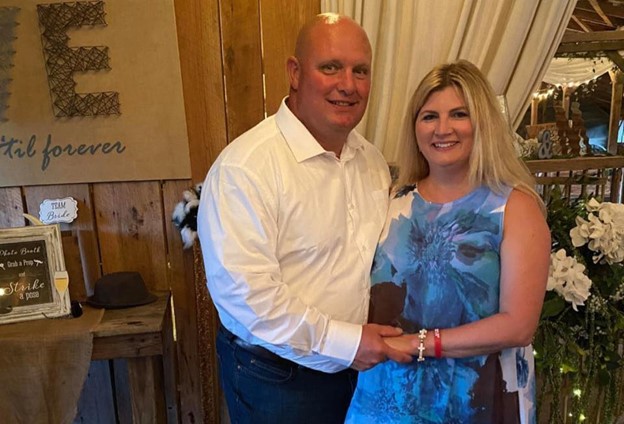
Stacy George is a former Morgan County Commissioner. George, a published author, has twice run for the Republican nomination for Governor of Alabama (2014 and 2022). However, for the last 13 and a half years, George has worked as a corrections officer for the Alabama Department of Corrections (ADOC) – until yesterday. George is just the latest ADOC officer who, overwhelmed by the hours, personal risks, and conditions of the state’s prisons, has left government service. George told Alabama Today on Thursday that he is frustrated by the “inhumane” conditions and is planning a new book exposing the problems at ADOC titled: At what point does punishment become revenge? George takes pride that the fact that in his time in ADOC service, he never had to use force on an inmate. “I have never had to spray an inmate, and I have never had to use a baton on one,” George said. “I usually don’t even carry a baton.” George said that the prisons are so understaffed that he fears that the inmates could potentially take control of one or more of the overcrowded facilities. “At any time, they can take a prison,” George warned. “It is a danger to the officers, the people that work there. The public is in danger.” George charged that often there are only 8 guards on duty at night (and sometimes as few as six) at an ADOC facility that holds 2,300. “There is no telling what they would do to the women in there if they took control,” George said, referring to the women officers that ADOC has hired to work in the prisons. George said that he has been tasked with taking the inmates to the showers even though the facilities are chronically understaffed. “That’s a job for three officers, and I have had to do it by myself,” George said. “When one has to go to the hospital, that is a job for three officers, and I have had to do that by myself. If he gets by me, he is loose in the hospital, and their guards aren’t even armed. I am thinking, what if I have to go to the bathroom while we are there?” “They told me I cannot even provide them with soap,” George continued. “When are we going to get some soap?” George said that he has had to frequently serve as the only guard on an entire cell block – normally a job for three guards and that there have even been shifts where they did not have a guard for each area, so in some of the dorms, the prisoners “just had to police themselves.” U.S. Judge Myron Thompson has ordered ADOC to hire 2,000 more guards – a mission that the troubled system has failed to do despite three years of trying. George said that ADOC depends on its officers working overtime to keep the facilities guarded. “When I go in there, I bring my lunch and my dinner because I don’t know when I am coming out. It could be ten hours, 12 hours, or 16 hours,” George said. “I am going to go to my grandson’s birthday party. I have not seen him for a year, I am going to be able to go to my Church, where they only see me about once a month.” The U.S. Department of Justice has accused ADOC of running the most dangerous prison system in the country and has sued the state claiming that a sentence to an Alabama prison constitutes a “cruel and unusual punishment” and is thus an unconstitutional violation of the Eighth Amendment. “How we treat them is shameful,” George said. “There are only two nurses for 2,300 inmates.” George said that in his tenure at ADOC, he has had to deal with between 50 and 100 stabbings of inmates. “It’s way over 50 – it could be a hundred,” George said. “One time, we came in, and there were blood trails all over the place. It took us four hours to find all the (stabbed) prisoners because there we were so short-staffed.” George said that inmates attempting, or threatening suicide, is a frequent occurrence. “The inmate said he was going to kill himself, and he cut himself with a razor blade,” George said. George then called for help, and the supervisor on the other end of the line asked, “How bad is he bleeding? Do you think he is trying to kill himself, and I said yes.” The inmate did not die. “There are prisoners down on the ground flopping in diabetic comas, and you don’t know whether it is that or a drug overdose,” George said. George said that he was involved in an accident a year ago, and since then, walking up and down the stairs inside the facility has become difficult for him. ADOC knew of his difficulty but did not give him any accommodations, ultimately leading to his resignation. “They have called and offered me two jobs since then,” George said of ADOC. George said that he is holding a press conference in front of the Department of Corrections headquarters in Montgomery on Friday. “I am going to blow the doors off of this system,” George said. To connect with the author of this story, or to comment, email brandonmreporter@gmail.com.
Families protest prison conditions at Alabama Capitol rally
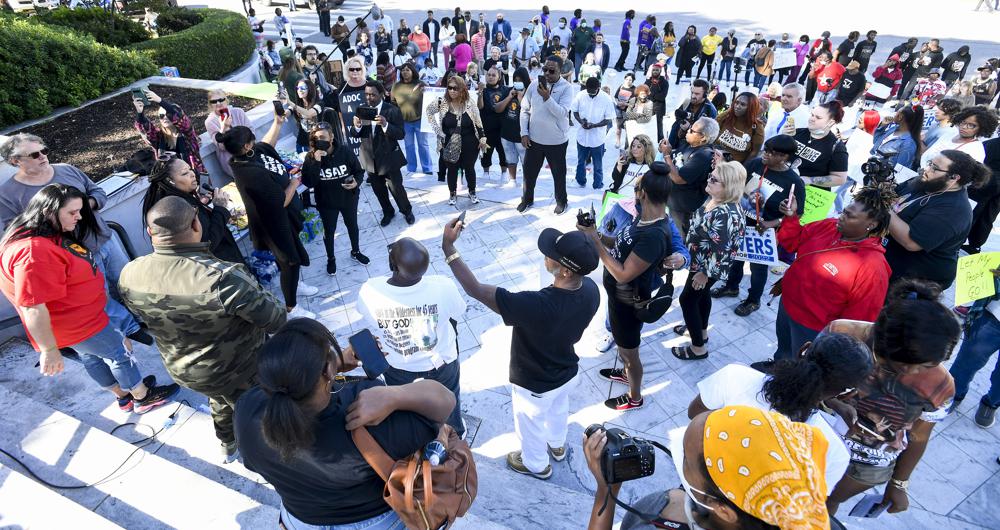
People with relatives and loved ones in Alabama prisons rallied outside the state Capitol Friday to decry what they described as inhumane conditions behind bars and a parole process that sees few inmates released. “Men are being murdered. Men are overdosing. Men are taking their own lives,” said Eric Buchanon, a former inmate who does prison ministry. “Somebody said, ‘Well, how can we stop people from taking their own lives?’ Well, if you had enough officers operating the prisons, who could monitor these men like they are supposed to, that would help.’” More than 200 people joined the rally outside the Capitol. Tombstones were placed on the white marble steps of the Alabama Capitol to represent the men who died in Alabama prisons from suicides, murders, and overdoses. The rally followed a three-week work strike at many prisons aimed at seeking changes to state sentencing laws and the parole system. Inmates refused to show up for jobs in prison kitchens, janitorial services, and laundries, jobs that keep the prisons functioning but for which the inmates receive no pay. The Alabama Department of Corrections said Friday that two facilities for men continue to have complete work stoppages, and three facilities have partial work stoppages. Inmates and activists have accused the Department of Corrections of using pressure tactics in an attempt to end the demonstration. Officials said the reduced rations and the lack of visits were the result of a prisoner labor shortage. At the Capitol rally, Sandy Ray carried a photo of the battered face of her son, Steven Davis, who died in 2019 after an altercation with corrections officers at William E. Donaldson Correctional Facility where he was incarcerated. “It’s about the things they are doing to human beings,” Ray said about her continued fight for changes in the prison system. She said it’s time for state officials to do the “right thing that they should have been doing all these years.” “If you are going to stay in office, how can you sleep at night knowing (inmates) are sleeping on floors with rats running across them? Roaches are being served with food,” Ray said. The U.S. Department of Justice is suing Alabama over the conditions in its prisons, saying the state is failing to protect male inmates from inmate-on-inmate violence and excessive force at the hands of prison staff. The case is slated for trial in 2024. Alabama officials have acknowledged problems but deny that the living conditions violate constitutional standards. Inmates and family members say that conditions have worsened in recent years despite the attention on the system. The rate of paroles has plummeted in recent years, according to state statistics. The state parole board this week granted parole to just six inmates of the 58 who had hearings, according to a news release Alabama faces a separate court order to add as many as 2,000 officers to man understaffed prisons but has been unable to fill the positions. Alabama Corrections Commissioner John Hamm told a legislative committee this summer that the department has 1,879 officers and 541 vacancies out of 2,420 budgeted positions. Republished with the permission of The Associated Press.
DOJ finds Alabama’s foster care system violates law

The federal government on Wednesday said the state of Alabama illegally discriminates against children in foster care with behavioral and emotional disabilities. The U.S. Department of Justice, in a news release, said the state’s foster care program has illegally placed hundreds of students with disabilities into “segregated and inferior educational programs,” a direct violation of Title II of the Americans with Disabilities Act. “Students with disabilities in Alabama’s foster care system are among the most vulnerable in the state’s care, and they deserve better than placement in segregated and inferior schools,” Assistant Attorney General Kristen Clarke, of the department’s Civil Rights Division, said in a statement. “The Civil Rights Division will defend every child’s right to equal educational opportunities in schools where they can be supported and challenged.” The department’s findings follow an investigation into allegations that the state denies children in foster care equal opportunity to basic educational services on the basis of disability. Gina Maiola, communications director for Gov. Kay Ivey, said in a statement that the Alabama State Department of Education and the Department of Human Resources have been “working proactively since 2018 to address the needs of our specialized treatment centers.” “These two agencies have been in communication with the Department of Justice to inform them on the steps being taken in that regard. I know the ALSDE and DHR will address any specific concerns given by the USDOJ. Bottom line, a top priority of the Ivey Administration is to ensure every Alabama student has the ability to receive a quality education,” Maiola said. The state is required to provide educational services for children in the foster care system, including when children are placed in psychiatric residential treatment facilities. According to the DOJ, students who are placed in such treatment facilities are automatically enrolled in segregated on-site schools without an appropriate educational assessment. In these segregated placements, the DOJ said students lack access to age-appropriate study materials, adequate instruction, and facilities such as libraries, science labs, and gyms. “These unnecessary placements, which can extend for long periods of time, sever children’s ties to their home schools, teachers, social activities, and peers,” Clarke’s office said. “The department concluded that, in most cases, these children could be appropriately served in general education settings where they would receive the many documented academic and social benefits of inclusion.” Republished with the permission of The Associated Press.
Alabama prisons reduce meals, nix visits amid inmate strike
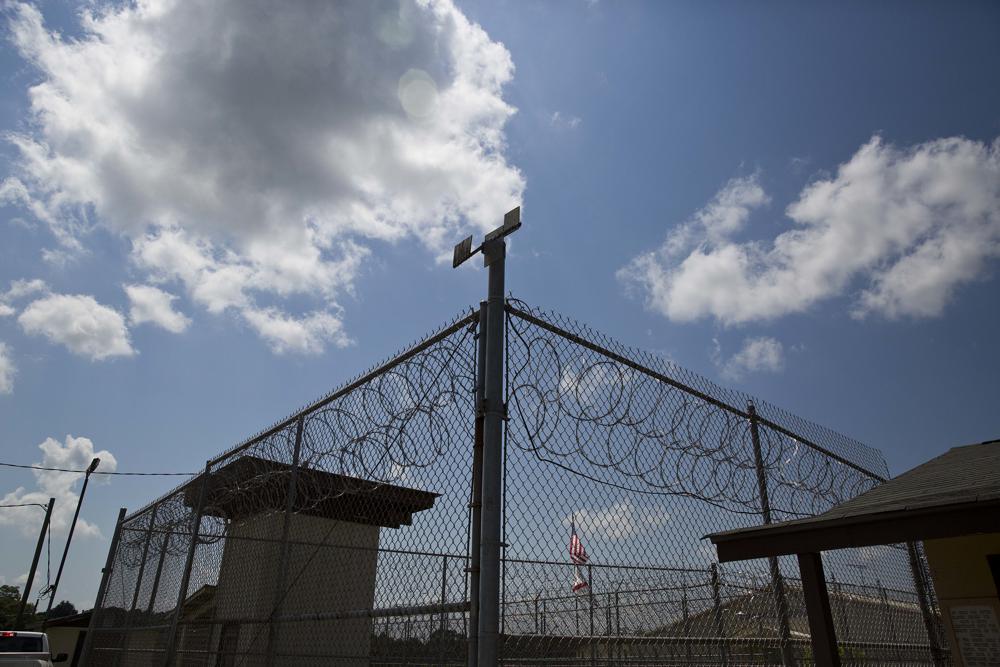
Thousands of inmates in Alabama’s overcrowded prison system are receiving only two meals a day during a prisoner work stoppage that was in its fourth day Thursday, and the agency said weekend visitation also was being canceled. While inmates and activists have accused the Department of Corrections of using pressure tactics in an attempt to end the demonstration, officials said the reduced rations and the lack of visits were the result of a prisoner labor shortage. Inmates provide much of the labor force inside prisons, the department said, so the lockups eliminated one of the three meals that normally are served to compensate for the lack of workers. “This is not a retaliatory measure but logistically necessary to ensure that other critical services are being provided,” the department said in a statement. Photos posted on social media showed brown bag meals consisting of a corn dog or peanut butter sandwich. The prison system said it would return to regular meal service once the strike ends, but it wasn’t clear how long that might take. The department said most of its large male prisons were still affected by the strike on Thursday, and visitation was being canceled this weekend because of the stoppages and their impact on prison staff. “Inmates have been notified and encouraged to notify any visitors,” the agency said. Activist Diyawn Caldwell, whose husband is incarcerated in Alabama, said canceling visitation was “just another mechanism for retaliation” by the state on inmates. She said prison officials also are threatening striking inmates with loss of living space in honor dorms, where conditions often are better than in other areas. “That’s huge in there because you’re taking merits they have earned away from them because they don’t want to perform free labor,” said Caldwell, who founded Both Sides of the Wall, which describes itself as a grassroots organization. Gov. Kay Ivey has rejected demands for criminal justice reforms, including changes to sentencing laws for habitual offenders, calling them unreasonable. Alabama prisons held more than 20,000 inmates in July, when the Department of Corrections issued its latest statistical report, despite being designed for only 12,115 people. The department runs 13 major prisons for men, the largest of which holds more than 2,200 men, and one for women. The Department of Justice is suing Alabama over the conditions in its prisons, saying the state is failing to protect male inmates from inmate-on-inmate violence and excessive force at the hands of prison staff. The 2020 lawsuit alleges that conditions in the prison system are so poor that they violate the constitutional ban on cruel and unusual punishment and that state officials are “deliberately indifferent” to the problems. Alabama officials have acknowledged problems but deny that the living conditions violate constitutional standards. Republished with the permission of The Associated Press.
Groups seek probe of Alabama use of virus funds for prisons

Nearly two dozen organizations have sent a letter asking the U.S. House Financial Services Committee to investigate Alabama’s plan to use $400 million in coronavirus pandemic relief funds to build two super-size prisons. The American Civil Liberties Union of Alabama, The Sentencing Project, and others signed on to a letter arguing that prison construction is an improper use of COVID-19 relief dollars from the American Rescue Plan. It asks Chairwoman Rep. Maxine Waters to hold hearings on the matter. “Directing COVID relief funds to a massive prison construction plan that long predates the pandemic is an absurd and inappropriate use of (American Rescue Plan) funds,” the organizations wrote. Alabama Gov. Kay Ivey signed legislation in October to tap $400 million of the state’s money from the federal plan to help build two super-size prisons. The Republican governor at the time called the construction plan “a major step forward” for the prison system, which faces various federal court orders and a lawsuit from the U.S. Department of Justice. The Alabama prison construction proposal calls for three new prisons — one north of Montgomery in Elmore County with at least 4,000 beds and enhanced space for medical and mental health care needs; another prison with at least 4,000 beds in south Alabama’s Escambia County and to replace the current women’s prison in Elmore — as well as renovations to existing facilities. Many existing facilities would close. Republican legislative leaders and Ivey have said they are confident that they can use the pandemic money for prison construction because the American Rescue Plan, in addition to authorizing the dollars for economic and health care programs, says states can use the money to replace revenue lost during the pandemic to strengthen support for vital public services and help retain jobs. But the opposed organizations argued that was not the intent of the money. “Building more prisons is a gross misuse of funds that were sent to help the people of Alabama, not punish them,” said JaTaune Bosby, executive director of ACLU of Alabama, in a statement. Bosby added that, “There seems to be no urgency from elected officials to provide relief to the people incarcerated in their facilities.” The U.S. Department of Justice has sued Alabama over a prison system “riddled with prisoner-on-prisoner and guard-on-prisoner violence.” The Justice Department noted in an earlier report that dilapidated facilities were a contributing factor to the unconstitutional conditions but wrote “new facilities alone will not resolve” the matter because of culture, management deficiencies, corruption and violence. The department updated its complaint this year, saying conditions in Alabama prisons have not improved since the federal government warned of unconstitutional conditions earlier and that male inmates continue to live in deadly and dangerous conditions. Ivey’s office did not immediately respond to an email seeking comment.
No settlement for separated migrant families amid criticism

Migrants whose children were taken from them under former President Donald Trump’s zero-tolerance border policy have not reached a settlement agreement with the U.S. government, a lawyer for the families said Thursday as he and other advocates pushed back at increasing criticism of a proposal to pay compensation to them. Attorney Lee Gelernt of the American Civil Liberties Union would not discuss details of the talks nor confirm a previously reported settlement proposal of several hundred thousand dollars to each affected person. He did, however, hold out the possibility of a trial, featuring parents separated from children as young as six months as witnesses, if there’s no agreement to end the litigation. “All I can say is there’s no deal on the table, and we have no timeframe necessarily,” Gelernt said in a conference call with reporters. The settlement talks, which would typically be private until an agreement is finalized, have instead become a new line of attack for Biden administration critics seeking to tie the issue to the increasing number of migrants seeking to cross the U.S.-Mexico border over the past year. Republicans grilled Homeland Security Secretary Alejandro Mayorkas about it this week when he appeared before the Senate Judiciary Committee. “As you can imagine, many Americans think it’s a pretty outrageous idea to offer massive taxpayer-funded payments to illegal immigrants who broke our laws, particularly in the middle of a record-shattering border crisis that this administration has created,” Sen. Chuck Grassley, a Republican from Iowa, said at the hearing Tuesday. Mayorkas referred questions from the senators to the Department of Justice, which is handling the negotiations, though at one point, he disputed the suggestion that a settlement would encourage future migrants to seek to come to the U.S. About 5,500 children were forcibly removed from their parents under Trump’s zero-tolerance policy in which parents were separated from their children as the administration sought to discourage people from crossing the border, even if they were presenting themselves to authorities to seek asylum. Trump halted the practice in June 2018 amid widespread outrage, including from many Republicans, just six days before a judge ordered an end to the program in response to a lawsuit filed by the ACLU. In addition to negotiating a potential settlement, the Biden administration has also been working to reunite some of the families. There are believed to be hundreds, and perhaps as many as 1,000-2,000, parents who were separated from their children and still haven’t been located. The settlement talks had been going on quietly for months when The Wall Street Journal reported in October that the Justice Department was considering paying about $450,000 to each person affected. The Associated Press later confirmed the figure had been under consideration. In addition to the payment, settlement talks have also included a discussion of granting the families legal U.S. residency and providing counseling services. Asked about the amount on Nov. 3, Joe Biden appeared to misunderstand the question and said a payment of about $450,000 per person was “not going to happen.” He later said he supported a settlement without specifying an amount. “If, in fact, because of the outrageous behavior of the last administration, you coming across the border, whether it was legally or illegally, and you lost your child — You lost your child. It’s gone — you deserve some kind of compensation, no matter what the circumstance,” Biden said. “What that will be, I have no idea. I have no idea.” Migrant advocates say the amount of the settlement and the legal status of the families misses the point. “What’s really an issue is the question of whether we as a country are OK with ripping babies out of the arms of their parents,” said Conchita Cruz, co-executive director of the Asylum Seeker Advocacy Project. Gelernt noted in the call with reporters that many of the separated families were not entering the country illegally, as critics claim because they were presenting themselves to authorities to seek asylum, which is legal under U.S. law. He also pointed out that even non-citizens can sue the U.S. government, regardless of their immigration status. “The truth is that lawyers always settle cases, and it’s usually because it’s in their financial interest to do so,” he said. The advocates gave a sense of what a trial might entail, bringing a woman to the call who gave her name only as Leticia and tearfully described having her son taken from her as she sought asylum in 2017. It was 2 1/2 years before they were reunited, and she said the boy showed signs of psychological trauma from the separation. “Even now, after being reunited together, we live in fear a day that we could still be separated,” she said. “I could not imagine living through this pain again.” Republished with the permission of the Associated Press.
Alabama House approves prison plan using virus funds
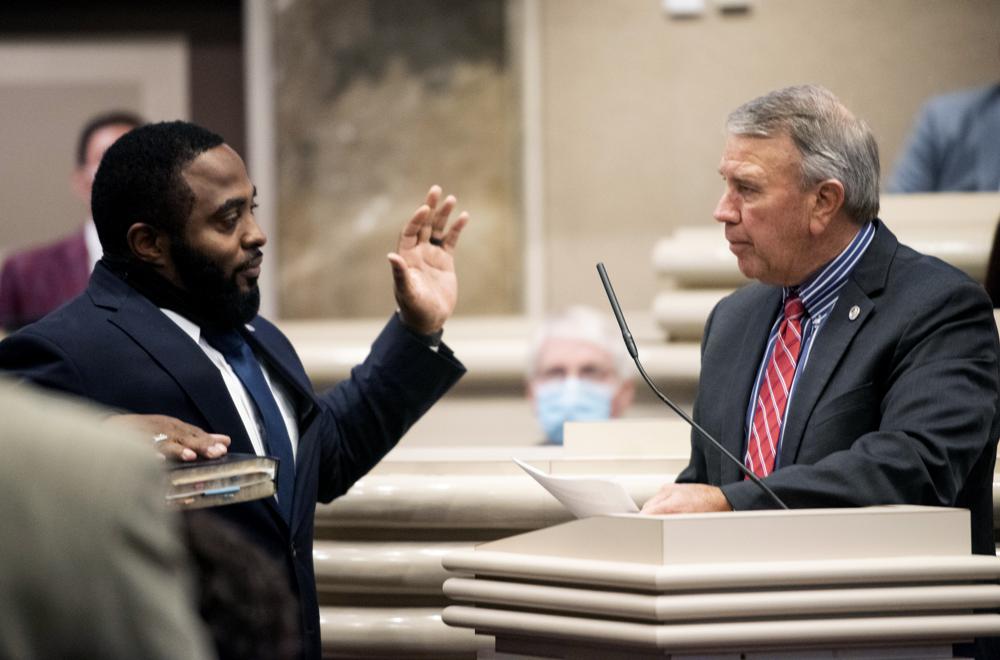
Alabama lawmakers on Wednesday headed toward swift approval of a prison construction package that would tap $400 million of the state’s pandemic relief funds to help pay for building three new lockups. The House of Representatives voted 74-26 for the $1.3 billion construction plan and 75-25 to use $400 million from the state’s share of American Rescue Plan dollars to help pay for the construction. The votes came after Republicans, who hold a lopsided majority in the Alabama Legislature, voted to cut off debate. The bills now move to the Alabama Senate. Republican Gov. Kay Ivey and GOP legislative leaders touted the construction plan as a partial solution to the state’s longstanding problems in corrections that led the U.S. Department of Justice to sue the state last year. The proposal brought sharp criticism from state Democrats, who argued it will not remedy the prison problems and said the state has needs in health care and education that could be helped by the $400 million. “I’m thinking about families, and how this money was supposed to be an additional injection of resources into the community. All of these folks that have been hurting, and we’re using this $400 million to build prisons,” said Democratic Rep. Merika Coleman of Pleasant Grove. Ivey and Republican legislative leaders have argued that the plan is appropriate because the American Rescue Plan says states can use some of the funds to replace revenue lost during the coronavirus pandemic to maintain services. “We are talking about human beings and their lives,” said House Speaker Mac McCutcheon, apparently referencing the people who live and work in dilapidated and dangerous state prisons. “This money is well-spent. It is something that needs to be fixed.” The lone Democrat in Alabama’s congressional delegation, U.S. Rep. Terri Sewell, wrote on Twitter that she is disturbed her state is using the pandemic money for prisons, “especially as the virus rages in our state.” “To be clear, the current state of the Alabama prison system is abhorrent, but the use of COVID-19 relief funds to pay for decades of neglect is simply unacceptable,” she said. The Department of Justice last year sued Alabama, saying male inmates in the state live in prisons “riddled with prisoner-on-prisoner and guard-on-prisoner violence.” In a 2019 report that preceded the lawsuit, the DOJ made it clear that new prisons alone will not solve the problems. Federal officials wrote that dilapidated conditions were a contributing factor to what it called unconstitutional conditions but emphasized that, “new facilities alone will not resolve the contributing factors to the overall unconstitutional condition of … prisons, such as understaffing, culture, management deficiencies, corruption, policies, training, non-existent investigations, violence, illicit drugs, and sexual abuse.” Alabama Democratic Party chair and state Rep. Chris England said the prison plan being proposed would not translate into a better system. “We will still be overcrowded. We will still be understaffed. We will still be under-resourced. And if our current commissioner is somehow still working, we will still be mismanaged,” England said. Republican Rep. Steve Clouse of Ozark said new modern prisons — in which prisoners would be housed in cell blocks instead of large dormitories with rows of bunks — would be a “foundation” for improving the system. “It’s a piece of the puzzle. It’s a big piece,” Clouse said. The Alabama prison construction proposal calls for at least three new prisons: one with at least 4,000 beds in Elmore County with enhanced space for medical and mental health care needs; a second of the same size in Escambia County; and a women’s prison — as well as renovations to existing facilities. Six prisons would close. The package of bills also includes a retroactive sentencing change that could allow up to 700 nonviolent inmates to seek shorter sentences, and a proposal to buy an empty private prison and use it for rehabilitation programs. Outside the Alabama Statehouse, about 40 people, including some parents of inmates, protested the plan and the use of pandemic funds. Carrying a banner that read, “Stop the Spending Spree,” the group said Alabama had other needs in medical care and education. “All they want is to build these prisons. They don’t care about reform,” said Sandy Ray, whose son died in a state prison in 2019 following a confrontation with officers. Republished with the permission of the Associated Press.
DOJ won’t defend Mo Brooks in lawsuit over Capitol violence
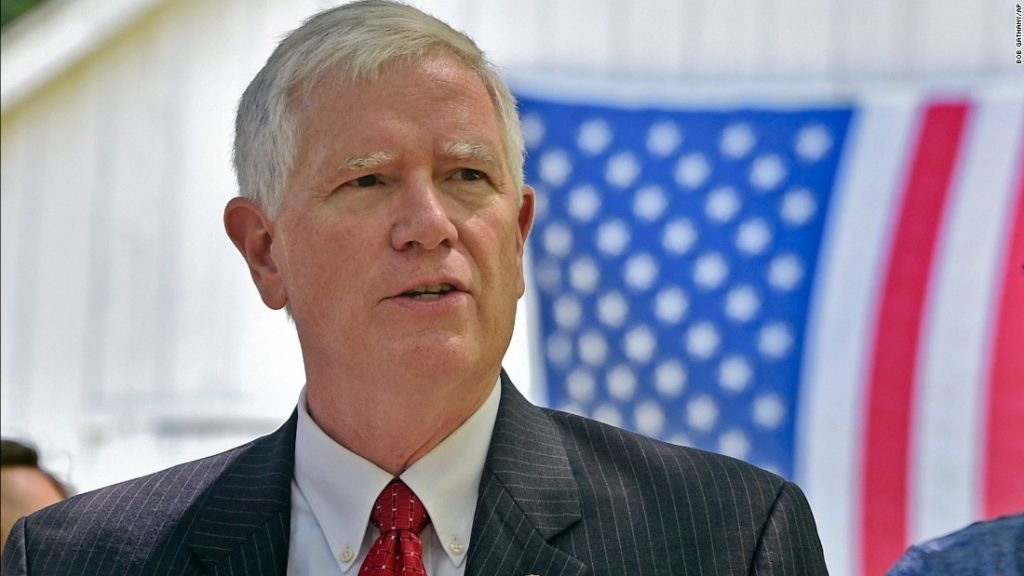
The U.S. Department of Justice won’t help defend Rep. Mo Brooks of Alabama against a civil lawsuit that claims he helped to incite the Jan. 6 violence at the Capitol. In a court filing Tuesday, the Justice Department urged a judge to deny Brooks’ request for immunity as a federal employee over his remarks at a pro-Donald Trump rally that occurred before the rioting at the U.S. Capitol. Brooks had argued that he was acting within the scope of his office when he spoke at a rally January 6 and thus was due the legal protections afforded federal employees and members of Congress who are facing civil lawsuits over their jobs. The Justice Department said the event was campaign-related and it would not certify that Brooks was acting in his official capacity. “The record indicates that Brooks’ appearance at the January 6 rally was campaign activity, and it is no part of the business of the United States to pick sides among candidates in federal elections,” Justice Department lawyers wrote. Democratic Rep. Eric Swalwell of California, who served as a House manager in Donald Trump’s last impeachment trial, filed a lawsuit in March against the former president and others, including Brooks, whose actions he charges led to the January 6 insurrection. Brooks, now a candidate for U.S. Senate, has come under fire for telling the pro-Trump rally that preceded the Capitol riot that, “today is the day American patriots start taking down names and kicking ass.” Brooks has maintained his words were intended to fire up the crowd for the next election cycle. “Anyone with a brain larger than a pea knew that I was not advocating violence,” Brooks told The Associated Press earlier this year. According to court filings, Brooks had argued that his appearance at the rally was within the scope of his office or employment because it was about the upcoming certification vote. He also noted that his constituents overwhelmingly supported Trump in the 2020 election. Federal law known as the Westfall Act authorizes the Justice Department to determine whether an employee was acting within the scope of their office or employment in an incident that is subject to a lawsuit claim. If the Justice Department certifies that the employee was doing so, the employee is dismissed and the action proceeds against the United States. In rejecting Brooks’ request for certification, the Justice Department wrote, “it appears that the fundamental purpose of the rally was to advance the electoral success of a presidential candidate.” Republished with the permission of the Associated Press.
Alabama prisons remain deadly, homicides increasing reports DOJ

Alabama prisons remain deadly and dangerous two years after federal officials warned the state of unconstitutional conditions, the U.S. Department of Justice said, noting that inmate-on-inmate homicides have increased from already high levels. Failed negotiations make it clear that Alabama will not voluntarily bring prisons into compliance and judicial intervention is needed, the Justice Department wrote Wednesday in an amended complaint in its ongoing lawsuit against the state. The Justice Department sued Alabama in December after issuing findings in 2019 and 2020 warning that conditions in state lockups are so poor that they violate the U.S. Constitution. “Since the United States notified the State of its findings, Alabama’s Prisons for Men have remained extremely overcrowded, prisoner-on-prisoner homicides have increased, prisoner-on-prisoner violence including sexual abuse has continued unabated, the physical facilities have remained inadequate, use of excessive force by security staff has remained common, and staffing rates have remained critically and dangerously low,” the amended complaint signed by Attorney General Merrick Garland stated. The Alabama Department of Corrections did not immediately respond to an email seeking comment. The state has previously said the Justice Department lawsuit failed to recognize the state’s progress. The lawsuit contends Alabama is violating the constitutional rights of prisoners, including the ban on cruel and unusual punishment, by failing to prevent excessive levels of prisoner-on-prisoner violence and sexual abuse, failing to protect prisoners from the use of excessive force by security staff, and failing to provide safe conditions of confinement. The state has acknowledged problems but denied that conditions are unconstitutional. The Justice Department said the homicide rate in Alabama’s prisons for men in 2018 was more than seven times the national average for prisons, and in fiscal year 2020, at least 16 prisoners were killed by other prisoners, according to available state data. Federal officials also said the prison system is not accurately reporting prison deaths. The Justice Department said a prisoner at Kilby Correctional Facility died from multiple stab wounds to his head, abdomen, back, and arm, but the state classified the prisoner’s death as “natural.” A 2017 autopsy revealed a prisoner at Elmore Correctional Facility died from blunt force trauma to the head. ADOC classified the death as “natural.” The filing listed a litany of incidents that federal officials said demonstrate a “pervasive pattern of life-threatening violence.” Those included that: — A prisoner at Easterling Correctional Facility in February was stabbed multiple times by two other prisoners in the head, neck, and shoulders and had to be airlifted to a hospital. — A prisoner at Easterling in August was seriously burned after another prisoner microwaved a mixture of baby oil, shaving powder, and coffee granules and poured it on the victim’s face and body while he was sleeping. — A 23-year-old prisoner was stabbed to death by another prisoner at Fountain Correctional Facility a day before he was scheduled to be released. The Associated Press reported Tuesday that was one of three inmate deaths in a single week from suspected inmate-on-inmate assaults. Republished with the permission of the Associated Press.
In effort to break drug-crime nexus, Kay Ivey awards grant for drug rehabilitation in state prisons

The State of Alabama is continuing to take steps to help inmates at state prisons overcome drug addictions that may have led or contributed to their prison terms. On Wednesday, Gov. Kay Ivey awarded $504,892 in grant funding to the Residential Substance Abuse Treatment (RSAT) program to help break this drug-crime nexus. The program is six-month course that will be conducted at seven prisons —Bullock Correctional Facility; Bibb Correctional Facility; Donaldson Correctional Facility; Easterling Correctional Facility; Staton Correctional Facility; Tutwiler Correctional Facility; Ventress Correctional Facility — with the intention of breaking the link between drug addiction and criminal activity. “We should strive to ensure that once a person is released from prison they will become a productive member of society,” Ivey said. “This program provides inmates the opportunity to escape their drug habit while in prison and create a new slate when they are released.” According to Bob Horton, Public Information Manager at ADOC, “the grant more than doubles the funding that the treatment program has received in previous years, which will enable the ADOC to expand services.” The Alabama Department of Economic and Community Affairs (ADECA) is administering the program from funds made available to the state from the U.S. Department of Justice (DOJ). The DOJ describes that is goal of the RSAT Program “is to break the cycle of drugs and violence by reducing the demand for, use, and trafficking of illegal drugs. RSAT enhances the capability of states and units of local government to provide residential substance abuse treatment for incarcerated inmates; prepares offenders for their reintegration into the communities from which they came by incorporating reentry planning activities into treatment programs; and assists offenders and their communities through the reentry process through the delivery of community-based treatment and other broad-based aftercare services.” RSAT in Alabama In Alabama, the six-month RSAT Program curriculum is divided into three phases of treatment that are two months each. “In the program’s first phase, inmates who are enrolled take part in full-time treatment activities aimed at dealing with denial of addiction, recognition of drug abuse consequences, understanding of the addiction cycle, and a thorough understanding of the recovery cycle,” Horton explained. “The program’s second phase exposes inmates to recovery issues closely related to substance abuse such as anger management, character defects, criminal thinking, and poor coping skills and habit development. In the third phase, the program focuses on relapse prevention and aftercare planning while working to develop positive life skills.” The ADOC offers aftercare dorms with 768 beds to those who are enrolled in the program to allow a person to spend time practicing and refining their daily addiction recovery. The program will be conducted by counselors who specialize in drug addictions and inmates receive drug screenings while in the program to monitor their success and to measure the program’s effectiveness. “Our main objective is to foster a person’s sobriety and to help them develop a responsible lifestyle once they return back to their community,” said Horton. As of August 2018, 314 prisoners have completed the RSAT program in 2018. Ivey notified Alabama Department of Corrections (ADOC) Commissioner Jeff Dunn the FY2018 grant had been approved.
DOJ seeks to dismiss Alabama’s lawsuit over inclusion of illegal aliens in US Census

The U.S. Department of Justice (DOJ) is pushing back on Alabama’s lawsuit against the federal government over inclusion of illegal aliens in US Census. The DOJ challenged the lawsuit in a motion filed Monday, arguing the case should be dismissed because the plaintiffs lack of jurisdiction. “There simply is no case or controversy that would justify having this Court wade into the constitutional and other claims raised by Plaintiffs’ lawsuit. Accordingly… this Court should dismiss Plaintiffs’ Complaint for lack of jurisdiction,” read the motion from the DOJ. In May, Alabama 5th District U.S. Rep. Mo Brooks and Alabama Attorney General Steve Marshall filed a lawsuit against the federal government over what they said was the Census Bureau‘s “unlawful” decision to include of illegal immigrants in census data “used to determine the apportionment of the U.S. House of Representatives and the Electoral College.” Marshall says the move will cause Alabama to lose a seat in the U.S. House of Representative as well as a vote in the Electoral College. “If the U.S. Census Bureau follows through with its plan to include illegal aliens in the 2020 census for purposes of apportionment, Alabama will lose both a seat in the U.S. House of Representative and a vote in the Electoral College,” explained Marshall. “Alabama’s loss will be another state’s gain, as states with a growing illegal alien population will be the beneficiary of this reapportionment. I have joined with Congressman Mo Brooks in filing suit against the federal government to stop the inclusion of illegal aliens in the census’s apportionment population. The Constitution does not permit the dilution of our legal residents’ right to equal representation in this manner.” Brooks echoed Marshall’s thoughts. “Each decade, 435 Congressional seats are apportioned among the states based on population. Congressional seats should be apportioned based on the population of American citizens, not illegal aliens. After all, this is America, not the United Nations,” said Brooks. But the DOJ contends the plaintiffs failed to demonstrate this could happen in their lawsuit. “Plaintiffs, however, have failed to demonstrate—even at the pleading stage—that the inclusion of illegal aliens would actually result in this injury. The very purpose of the census—an event that will not even take place until 2020—is to count the number of people residing in each state,” their motion read. “…Because the census has not yet taken place, thus making their claimed injury speculative, conjectural, and hypothetical. As a fallback, Alabama alleges that it is likely to lose funding if illegal aliens are included in the census, but that claimed injury is just as speculative as its claimed loss of representation because it relies upon the same type of prediction as to what the census will yield.” In their lawsuit, Marshall and Brooks argue the Census Bureau’s “Residence Rule” — which allows foreign nationals living in the United States to be counted in the census and allocated to the state of their “usual residence” regardless of whether they are legally present in the U.S. — violates the Fourteenth Amendment of the U.S. Constitution and the constitutional principal of equal representation: But the DOJ said it believes Alabama’s suit falls outside the zone of interests protected by the Constitution’s Census Clause. “And to the extent funding decisions are based on total population, Alabama would nonetheless receive its fair share based on its total population, including its population of illegal alien residents (many of whom use government services, such as attending schools). For those reasons alone, Alabama’s claim that it will lose federal funds if illegal aliens are included in the census is too speculative to support standing,” the motion explained. Brooks declined to comment on the DOJ’s motion when asked by Alabama Today. The State of Alabama’s lawsuit against the U.S. Department of Commerce and the Census Bureau was filed May 21, 2018, in the U.S. District Court for the Northern District of Alabama. Click HERE to view the lawsuit. Read the DOJ’s filing below:


